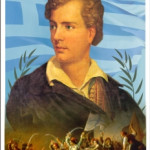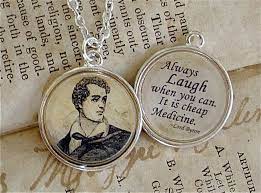Lord Byron- A short Biography

Lord Byron, (full name:George Gordon Byron)
was one of the leading figures of the Romantic Movementand is regarded as one of the greatest English poets who enchanted European scholars with his poetry and ambiguous personality.
He was born on January 22, 1788, in London, England. When his father, Captain John (“Mad Jack’)Byron squandered most of his fortune, his mother, Catherine Gordon, a Scots heiress, took her baby son to Aberdeen. There they lived in very poor income.
George Gordon Byron had been born with a clubfoot and early developed an extreme sensitivity to his lameness. In 1798, at age 10, he inherited the title and estates of his great-uncle William, and he became the 6th Baron Byron.
Byron received his early formal education at Aberdeen Grammar School. After living at Newstead for a while, in 1801 he went to Harrow, one of England’s most prestigious schools.
In 1805 Byron entered Trinity College, Cambridge, In 1806 Byron had his early poems privately printed in a volume entitled Fugitive Pieces.
Byron’s first published volume of poetry, Hours of Idleness, appeared in 1807.
He travelled extensively across Europe, especially in, where he lived for seven years in the cities of Venice, Ravenna, and Pisa.
In April 1823 he agreed to act as agent of the London Committee, which had been formed to aid the Greeks in their struggle for independence from Turkish rule. In July 1823 Byron left Genoa for Cephalonia. He sent £4,000 of his own money to prepare the Greek fleet for sea service and then sailed for Missolonghi on December 29 to join Prince Alexandros Mavrokordatos, leader of the forces in western Greece. The Greeks’ free and open frankness contrasted strongly with English reserve and hypocrisy and served to broaden his views of men and manners. Byron made efforts to unite the various Greek factions and took personal command of a brigade of Souliot soldiers, reputedly the bravest of the Greeks. But a serious illness in February 1824 weakened him, and in April he contracted the fever from which he died at Missolonghi on April 19, at the age of 36 .Deeply mourned, he became a symbol of disinterested patriotism and a Greek national hero. His body was brought back to England and, refused burial in, Westminster Abbey was placed in the family vault near Newstead. Ironically, 145 years after his death, a memorial to Byron was finally placed on the floor of the Abbey.
»The mountains look on Marathon
And Marathon looks on the sea;
And musing there an hour alone,
I dreamed that Greece might still be free.
For standing on the Persian’s grave,
I could not deem myself a slave». Extract from »The Greek Isles»
““Τώρα θα πάω να κοιμηθώ. Καληνύχτα» (τα τελευταία λόγια του ποιητή στο Μεσσολόγγι)
Επιμέλεια Άρθρου: Χούμου Ευαγγελία
Σχολιάστε
Για να σχολιάσετε πρέπει να συνδεθείτε.



